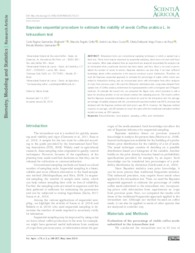Bayesian sequential procedure to estimate the viability of seeds Coffea arabica L. in tetrazolium test.
Bayesian sequential procedure to estimate the viability of seeds Coffea arabica L. in tetrazolium test.
Author(s): BRIGHENTI, C. R. G.; CIRILLO, M. A.; COSTA, A. L. A.; ROSA, S. D. V. F. da; GUIMARÃES, R. M.
Summary: Tetrazolium tests use conventional sampling techniques in which a sample has a fixed size. These tests may be improved by sequential sampling, which does not work with fixedsize samples. When data obtained from an experiment are analyzed sequentially the analysis can be terminated when a particular decision has been made, and thus, there is no need to pre-establish the number of seeds to assess. Bayesian statistics can also help, if we have sufficient knowledge about coffee production in the area to construct a prior distribution. Therefore, we used the Bayesian sequential approach to estimate the percentage of viable coffee seeds submitted to tetrazolium testing, and we incorporated priors with information from other analyses of crops from previous years. We used the Beta prior distribution and, using data obtained from sample lots of Coffea arabica, determined its hyperparameters with a histogram and O?Hagan?s methods. To estimate the lowest risk, we computed the Bayes risks, which provided us with a basis for deciding whether or not we should continue the sampling process. The results confirm that the Bayesian sequential estimation can indeed be used for the tetrazolium test: the average percentage of viability obtained with the conventional frequentist method was 88 %, whereas that obtained with the Bayesian method with both priors was 89 %. However, the Bayesian method required, on average, only 89 samples to reach this value while the traditional estimation method needed as many as 200 samples.
Publication year: 2019
Types of publication: Journal article
Unit: Embrapa Coffee
Keywords: Beta distribution, Coffee, Prior distribution, Sampling, Seed analysis
Observation
Some of Embrapa's publications are published as ePub files. To read them, use or download one of the following free software options to your computer or mobile device. Android: Google Play Books; IOS: iBooks; Windows and Linux: Calibre.
Access other publications
Access the Agricultural Research Database (BDPA) to consult Embrapa's full library collection and records.
Visit Embrapa Bookstore to purchase books and other publications sold by Embrapa.

